Remember that vast stretch of whiteness at the end of the last scene? It turns out to be a sea with lilies[1]Or lily-like flowers as Eustace the stickler for scientific accuracy insists. growing in it like a giant garden pool. In the book, C. S. Lewis describes the wonders of the Last Sea before the End of the World at some length. How the sun is so bright the sailors can’t bear it until they drink the sweet water. How the water is so clear they can see the shadow of the Dawn Treader at the bottom of the sea. The strange, dreamy state into which it puts everyone. Here all we get are lilies but to be fair, they’re nice as far as this movie’s visuals go. Caspian, Reepicheep, Lucy, Edmund, and Eustace sail through the Silver Sea, as it’s called in the source material, in a longboat. Now in the book, Caspian parts way with the others before this. I prefer that since a scene with Aslan will shortly ensue that strikes me as making much more sense as a private conversation between him, Edmund, Lucy and Eustace without any Narnians present. But, hey, this isn’t the dumbest change the movie could make.

We get some dialogue that pays lip service to C. S. Lewis’s depiction of Eustace being “undragoned.” Lip service is better than nothing, I suppose, and I’ve got to praise Will Poulter’s performance. He’s just as great here as the penitent Eustace as he was as the arrogant Eustace earlier even though that role was more fun. I love that the movie got an actor who could be both comedic and dramatic. It bugs me a bit that the dialogue eventually goes back to how awesome it was for Eustace to be a dragon. We had enough of that before.
Edmund: So what was it like? When Aslan changed you back?
Eustace: No matter how hard I tried, I just couldn’t do it myself. Then he came towards me. It sort of hurt[2]That’s pretty weak compared to “it hurt worse than anything I’ve ever felt” which Eustace says in the book but I feel like I’ve carped enough about this part. but…it was a good pain. You know, like when you pull a thorn from your foot. Being a dragon wasn’t all bad. I mean, I think I was a better dragon than I was a boy really. I’m so sorry for being such a sop!
Edmund: It’s OK, Eustace. You were a pretty good dragon.

“My friends, we have arrived,” Reepicheep announces as the longboat pulls up to a shore from which a giant wave rises. Not a wave that’s going to crush them but a sort of permanent wave. This is a bit of a change from the book where the shore is sort off to the side of the wave. There are also initially visions behind it in the book.
…now they saw something not only behind the wave but behind the sun. They could not have seen even the sun if their eyes had not been strengthened by the water of the Last Sea. But now they could look at the rising sun and see it clearly and see things beyond it. What they saw — east ward, beyond the sun — was a range of mountains. It was so high that either they never saw the top of it or they forgot it. None of them remembers seeing any sky in that direction. And the mountains must really have been outside the world. For any mountains even a quarter or a twentieth of that height ought to have had ice and snow on them. But these were warm and green and full of forests and waterfalls however high you looked. And suddenly there came a breeze from the east, tossing the top of the wave into foamy shapes and ruffling the smooth water all round them. It lasted only a second or so but what it brought them in that second none of those three children will ever forget. It brought both a smell and a sound, a musical sound. Edmund and Eustace would never talk about it afterwards. Lucy could only say, “It would break your heart.” “Why,” said I, “was it so sad?” “Sad!! No,” said Lucy.
There are no mountains or forests or mountains or waterfalls even faintly visible behind the wave in the movie. Maybe they were too expensive. Maybe the filmmakers worried all that about blocking out the sky would come across as more intimidating than appealing. Still, the wave is pretty impressive by itself.

The voyagers disembark and walk alongside the wave. In a fairly cool reveal, the camera pans along their shadows before arriving at Aslan’s.[3]In the book, Aslan initially appears as a lamb and gives the heroes a breakfast of roasted fish. There wasn’t really a point to that except to hammer home that Aslan is really Jesus (Christ … Continue reading “Welcome, children,” he says, “You have done well. Very well indeed. You have come far and now your journey is at its end.” Lucy asks if this place is Aslan’s country. “No, my country lies beyond,” Aslan replies, indicating the wave. “Is my father in your country?” asks Caspian. “You can only find that out for yourself, my son,” says Aslan, “but you should know if you continue, there is no return.”

As the others watch solemnly, Caspian walks over to the wave and even wistfully touches it with his hand. But then he turns back. “You’re not going?” Edmund says in surprise. “I can’t imagine my father would be very proud that I gave up what he died for,” says Caspian. Um, the last movie stated that Caspian’s father was assassinated in his sleep. He didn’t die for some noble cause. It’s bad enough these screenwriters can’t remember stuff from the books. Now they can’t even remember the continuity they themselves created! Maybe Caspian means that his father died because he wouldn’t give up the crown to Miraz. But taken out of context, that sounds petty rather than noble. This really could have been worded better. “I’ve spent too long wanting what was taken from me and not what was given,” continues Caspian, “I was given a kingdom. People. I promise to be a better king,” he says to Aslan. “You already are,” replies the lion.
Now there’s nothing about Caspian’s father in the book, apart from the seven lords being his friends. Interestingly, in another book, The Great Divorce, C. S. Lewis wrote that a person’s longing for Heaven should be primarily a longing for God, not dead loved ones. But it seems like that’s the only way these screenwriters could relate to wanting to go to Heaven. As I wrote earlier though, wanting to reunite with dead loved ones is still a potent theme. However…well, I’d better get into more differences between the book and the movie first. In the book, Caspian actually goes kind of crazy insisting that he’s going to go with Reepicheep to the End of the World while he’s still on the Dawn Treader. The crew objects, reminding him of his duties to Narnia. Then Caspian gets angry and insists that no one, not even Reepicheep, will go even though that means the last three lords will never awaken. Then Aslan gives him a stern reprimand in private and a tearful Caspian tells Edmund, Lucy and Eustace that they must accompany Reepicheep without him. I think that’s all more interesting than what the film does but it probably wouldn’t have worked without the siren-like atmosphere that Lewis created for the Last Sea in the book, something in which the movie shows little interest. I do think the idea of a scene where Caspian is given the opportunity to go to Aslan’s country and search for his father but declines out of a sense of duty to his kingdom is interesting even if it’s not as dramatic as what the book does. But it feels weird to me in context since the movie only established Caspian having this wish in one brief scene half an hour ago. It’s hard to muster up an emotional reaction greater than “oh, that’s nice, I guess.” It’s like the idea only occurred to the writers when they were almost done writing the script and they never did subsequent drafts to further develop it. Even Caspian’s line about promising to be a better king doesn’t make that much sense. How has he been a bad king recently?

Aslan turns to the other humans. Edmund tells Lucy he actually thinks it’s time they went home. “But I thought you loved it here,” she says. “I do,” he says, “but I love home and our family as well. They need us.” I’m not sure what happened to give Edmund that particular revelation. He hasn’t ever mentioned their family since the beginning of the movie. But that’s arguably realistic. There isn’t always a big moment of realization in real life as there is in a story. Sometimes you find your priorities have changed and you can’t pinpoint when that happened or what changed them. Reepicheep speaks up and bows to Aslan. “Your Eminence,” he says, “ever since I can remember, I have dreamt of seeing your country. I’ve had many great adventures in this world, but nothing has dampened that yearning. I know I am hardly worthy but with your permission, I would lay down my sword for the joy of seeing your country with my own eyes.” Reepicheep never asks Aslan’s permission like this in the book, mainly because I don’t think he ever meets him in that story[4]You’ll recall he met him in Prince Caspian., but this speech feels exactly like something he would say, and Simon Pegg delivers it well.

“My country was made for noble hearts such as yours,” Aslan says, “no matter how small their bearers be.” Reepicheep beams and bows again. I could nitpick this dialogue from a Christian standpoint, but I won’t since this blog isn’t aimed at specifically Christian readers. I don’t want to bore secular fans so I’m just going to ignore-
Caspian: No one could be more deserving.
Reepicheep: Well, now.
Edmund: It’s true.
Twitch.
You know what? I am going to get into this! Christians believe that sinful human beings are unworthy of Heaven, but that God allows (some of them) there out of grace. There’s some nuance here[5]Catholics and Protestant differ as to how much salvation is a matter of grace and how much a matter of good works. But it’s not like Catholics don’t believe in grace at all. but no serious Christian talks about Heaven as something someone deserves. To be fair though, it’s not like that’s a theme of the Narnia books. The only characters we see enter Aslan’s country there are heroes or at least misguided but well-meaning antagonists. It’s not much of a stretch for someone to read the books and conclude that Aslan’s country is for those with “noble hearts.”[6]Also, to really get into Christian theology, Reepicheep’s fate in The Voyage of the Dawn Treader corresponds to those of the biblical figures of Enoch and Elijah who were taken to Heaven … Continue reading Still, it’s another example of the adaptation wanting to appeal to the Christian section of the book’s fanbase but not really understanding what would please them.
Anyway, Edmund and Reepicheep bow to each other. Then Lucy finally gets to indulge her wish to cuddle Reep. “Goodbye, Lucy,” he whispers. It’s a heartwarming moment.
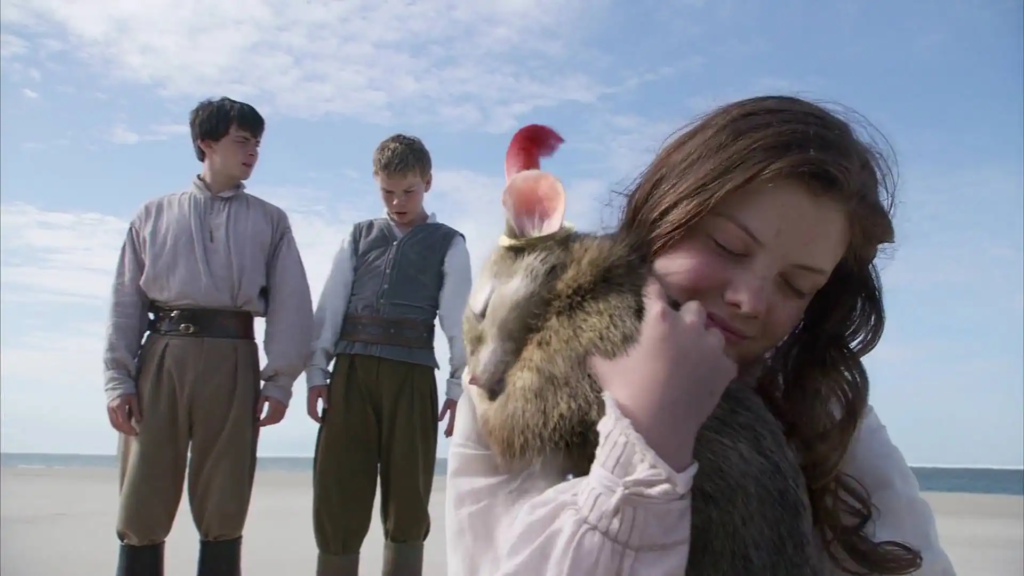
Now it’s Eustace’s turn to bid the mouse farewell. “I don’t understand,” he sobs, “Will I not see you again? Ever?” See, if the filmmakers really knew how to pander to Christian audiences, they might have Reepicheep tell Eustace he can indeed see him again eventually. To be fair though, the pandering might cross over into annoying in that case. What Reepicheep does say is “What a magnificent puzzle you are!” Ugh, even this, easily one of the best scenes in the movie, has some clunky lines! “And a true hero. It has been my honor to fight beside such a brave warrior and a great friend.” With that, Reepicheep runs over to wave where a little coracle awaits him.[7]In the book, Reepicheep picked up the coracle on Burnt Island, a location cut from the movie. I don’t blame the adaptation for cutting it since nothing else happened on that island, but I like … Continue reading “I won’t be needing this,” he says, plunging his sword in the wet sand. In the book, he flings it into the lilies which strikes me as a much more dramatic visual but oh well. With a smile on his face, Reepicheep paddles the coracle over the crest of the wave into the unknown. This is a really nice sendoff to the character. The music that plays in this scene is easily some of the soundtrack’s best. And the fact that Eustace’s relationship with Reepicheep was one of the most well developed in the movie, even if I didn’t always love it, really helps.


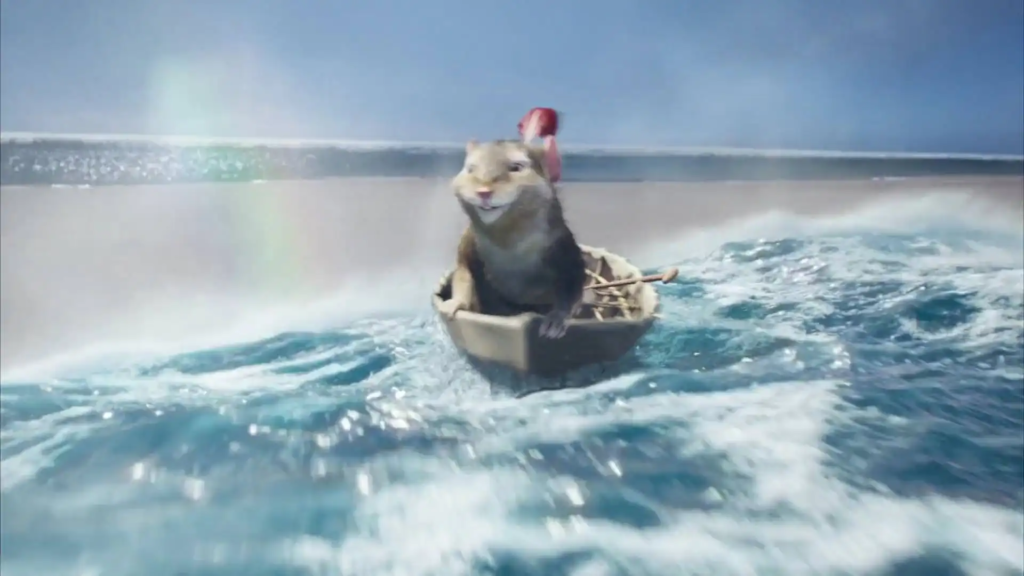
Yet it still suffers from not having been set up well. Unlike with Caspian, the movie thought to introduce Reepicheep’s yearning for Aslan’s country towards the beginning, not when the story was halfway through. But the problem with that is by the time, we get to the end, I’d forgotten about it. It’s not like the book brings up Reepicheep’s desire that often either. But in the book, there were no seven swords or evil Mist to overwhelm it. Again, it’s hard to muster up an emotional reaction greater than “oh, that’s nice, I guess.” All of which frustrates me since, taken out of context, this is a great, if imperfect, scene that captures the heart of the book while still doing a bit of its own thing.
Lucy: This is our last time here, isn’t it?
Aslan: Yes. You have grown up, my dear one, just like Peter and Susan.
Lucy (tearfully): Will you visit us in our world?
Aslan: I shall be watching you always.
Lucy: How?
Aslan: In your world, I have another name. You must learn to know me by it. That was the very reason you were brought to Narnia, that by knowing me here for a little, you may know me better there.
Lucy: Will we meet again?
Aslan: Yes, dear one. One day.
This dialogue is quite close to the book, and I appreciate that. But I feel like some Christian fans give the movie more credit deserves for keeping the spiritual message here. What makes the parts about Aslan having another name in the characters’ own world-the same world as the readers-and them needing to know him by it Christian is the larger context of the series. But apart from his country being the afterlife[8]And, technically, the movie doesn’t even affirm that. Aslan tells Caspian he can only learn if his deceased father is there by going there himself. That’s not exactly Christian assurance., there’s nothing in this movie to indicate Aslan is any god, let alone the Christian God. We certainly don’t get the impression that he’s whole point of existence. It’d be far more in keeping with the movie’s overall spirit if he told Edmund and Lucy they didn’t need him anymore. As a fan of the books, I’m grateful they didn’t do that, and I can enjoy the scene by ignoring the rest of the movie and recalling the source material. But citing this scene by itself as evidence that the movie keeps the book’s Christian themes strikes me as shallow.
Aslan roars, creating a sort of passageway through the giant wave. In the book, it was more like he tore apart the sky to send Lucy, Edmund and Eustace home but I guess that was too hard to visualize. Still, I do like the visual we get.
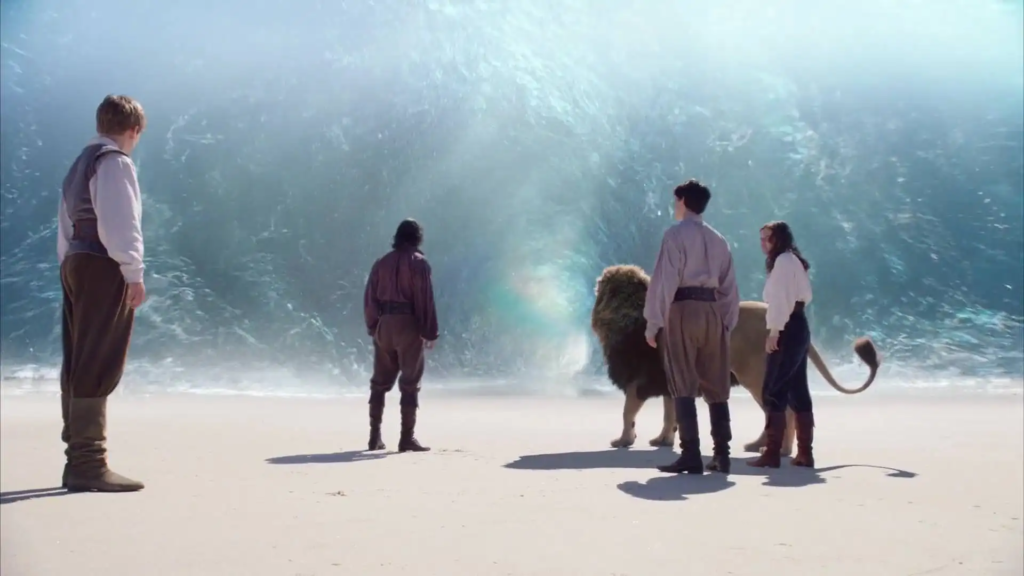
“You’re the closest thing I have to family,” says Caspian, “and that includes you, Eustace.” Of course, Eustace is like family. Who else could be such a pain? The dialogue is a bit cliche but it’s a fair description of Caspian’s relationship to the characters in the book. They hug. Then Edmund and Lucy hug Aslan. Ben Barnes and Will Poulter are excellent as ever. Georgie Henley has some of her best moments in this movie.[9]Not her best moments in any movie, mind you, or even in any Narnia movie. But still. Skandar Keynes…well, he isn’t enough of a focus for his performance to be too distracting. And the music for this whole scene truly is beautiful. It feels like this an ending to a totally different movie, one much better and truer to the book, that somehow got edited onto the tail end of this one! I sure wish I could find the rest of that movie. Still, my affection for the first two Narnia films and for Edmund and Lucy’s characters there, even if I haven’t been that interested in them here, helps make this farewell moving for me.

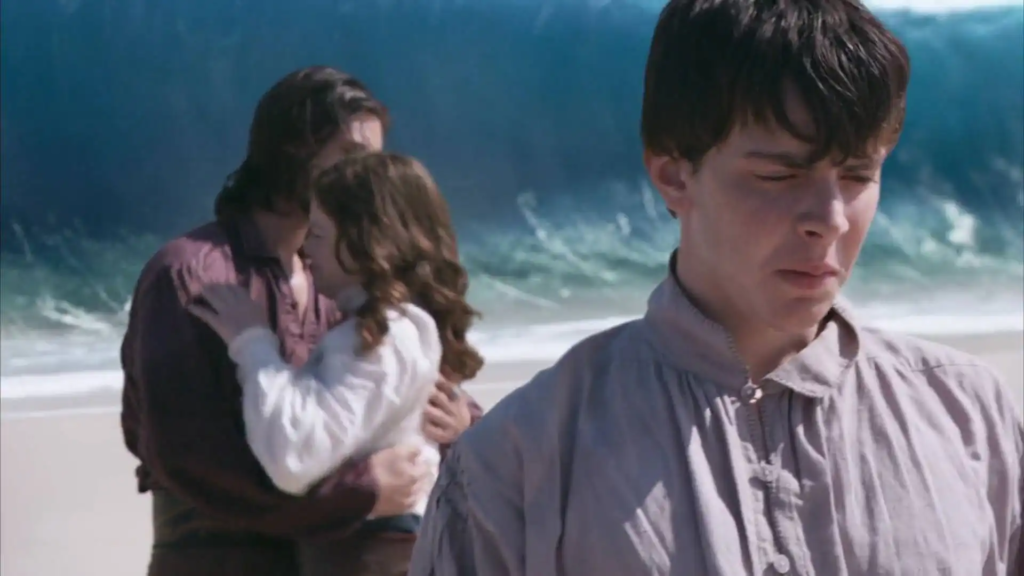

Eustace asks Aslan if he’ll ever come back. “Narnia may yet have need of you,” says Aslan. In the book, when Lucy asked if Eustace would ever return, Aslan simply refrained from answering which I prefer. The movie makes the sequel hook more obvious which is ironic considering that, unlike with the literary version, there would be no sequel. Oh well. Eustace nods gratefully. He and his cousins step into the tunnel of water then turn around. Their last glimpse of Caspian and Aslan is obscured as the opening closes behind them. They find themselves swimming up the surface. Suddenly, Edmund’s hands grip a bedframe. He and the others are back in Lucy’s bedroom at Cambridge. All the water drains into the painting of the Dawn Treader on the floor. Before long, everything is as dry as if the room had never been flooded. Man, I feel like throughout that climax at Dark Island, I was sick of the movie and begging for it to finish and now that it is finishing, I find myself calling, “Wait! Come back! You’re just starting to get really good!”
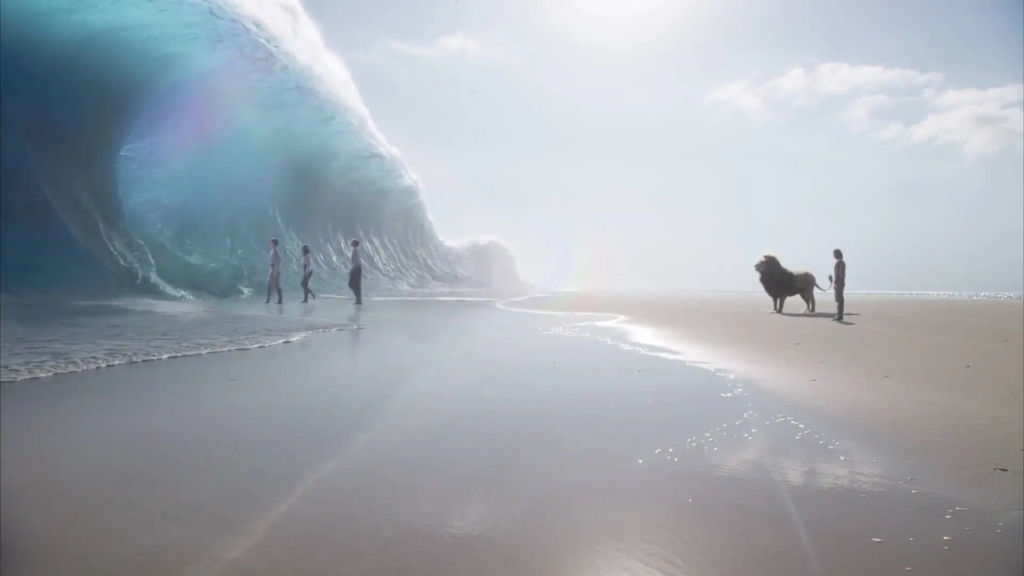
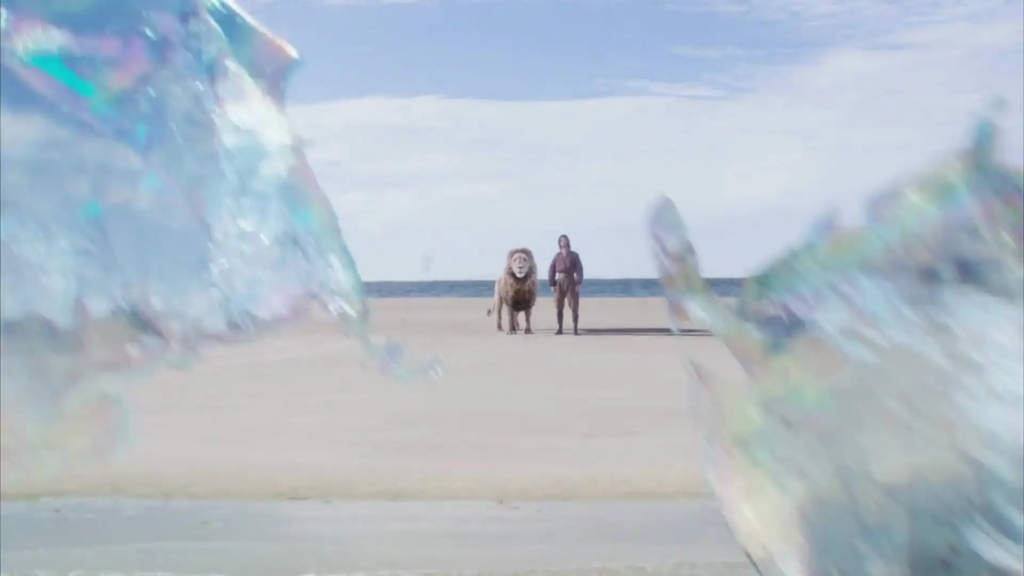
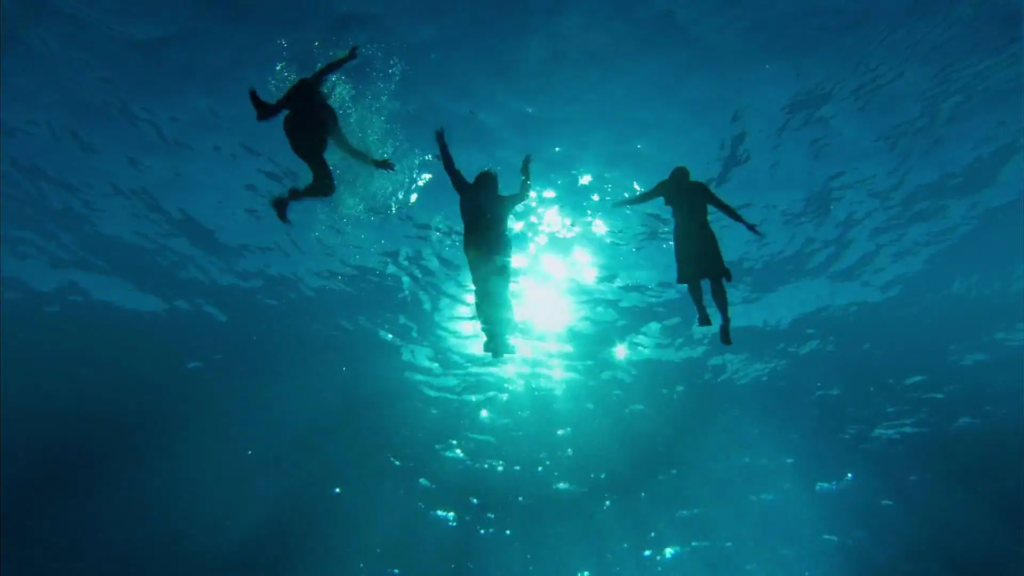

From downstairs, comes the (uncredited) voice of Aunt Alberta. “Eustace! Eustace! What are you going up there? Jill Pole’s dropped in for a visit.” Jill Pole is the name of the protagonist of The Silver Chair, the next Narnia story chronologically. Although Walden Media would never get to adapt that particular book, it gives me great joy to think she still exists in their Narnia universe and some version of her story will happen though I never see it myself. We get some closing voiceover narration from Eustace which is weird since neither this movie nor any of the other Narnia movies have had narration. Maybe it’s supposed to be another of Eustace’s diary entries, but it doesn’t feel like one. Anyway, the sentiments in the voiceover are pretty obvious but I don’t hate it or anything. “We spoke of Narnia often in the days that followed and when my cousins left after the war ended, I missed them with all my heart as I know all Narnians will miss them till the end of time.” Reverently, Eustace hangs the painting back on the wall.
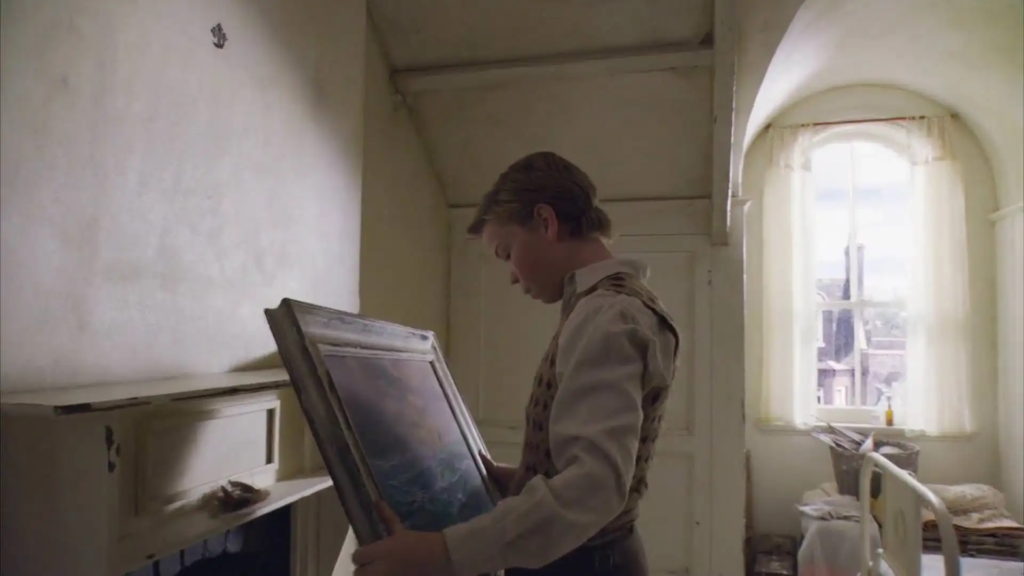
As he and his cousins have a last look at the room before they exit, the water in the painting briefly comes to life again as if waving goodbye to them.[10]Heh. Waves. Waving. Just as in the first Narnia movie, our last image is of a door closing. I love the symbolism of that, perhaps even more than in that first movie since now the door is not just closing for the viewer. Edmund and Lucy won’t be returning either until…well, read The Last Battle. This is the only Narnia movie that doesn’t end with the sound of Aslan’s roar. I wouldn’t have minded hearing it one more time, but I don’t really mind its absence either.

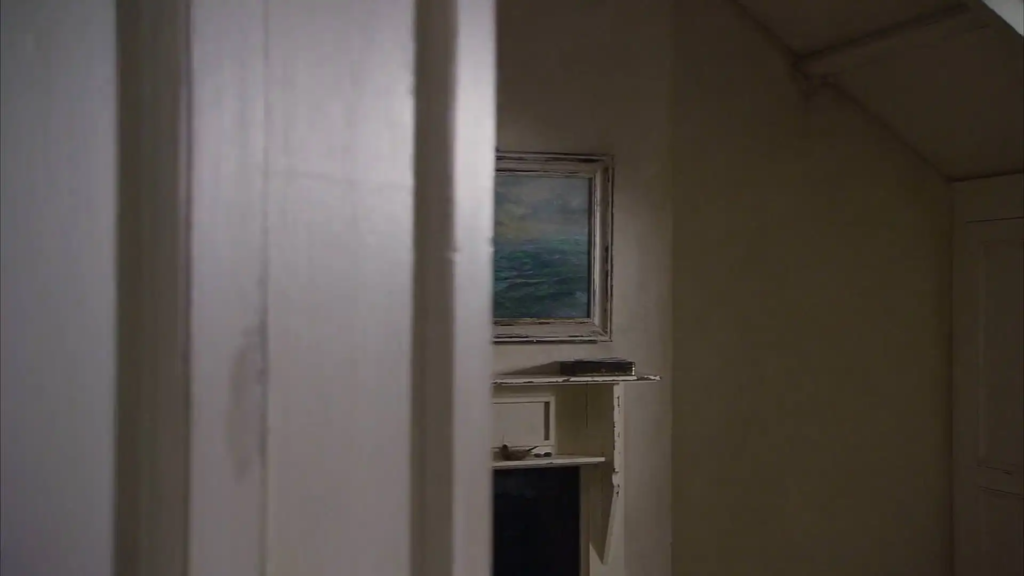
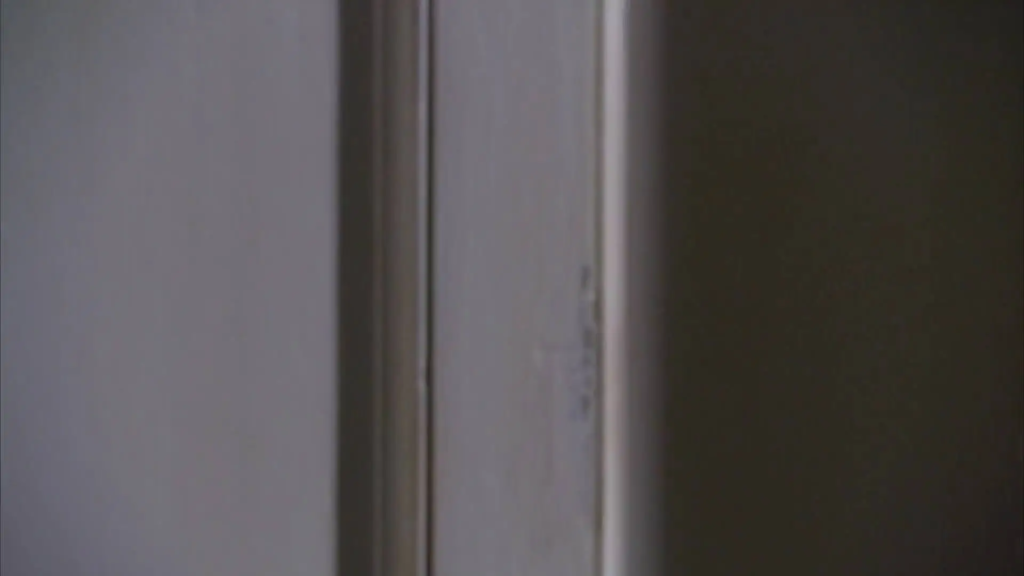
This movie only has one end credits song: There’s a Place for Us by Carrie Underwood. It’s kind of awkward transitioning from that quiet somber ending to this somewhat bombastic anthem. I prefer how with the other Narnia films the score for the last scene blended into the first credits song.[11]Man, everything about this series was starting go downhill! And some of this song’s lyrics make me roll my eyes. (“We can be the kings and queens/of anything if we believe…exactly who we are is just enough.”) But I do appreciate that it’s about being made for something beyond this visible world. (“When these broken hands are whole again/we’ll find what we’ve been waiting for/We were made for so much more!”) A famous quote by C. S. Lewis is “If I find in myself desires which nothing in this world can satisfy, the only logical explanation is that I was made for another world.” Whether a reader agrees with that idea or not, it’s a big part of Narnia’s poetic appeal, one I wish the movie itself had emphasized. In a fun touch, the credits feature Pauline Baynes’s illustrations for the original book though viewers unfamiliar with it may be confused as to why Edmund and Eustace have swapped their hair.

The movie is dedicated to the memory of Peter Apted.
Concluding Thoughts
The Voyage of the Dawn Treader (2010) was less of a box office disappointment the Prince Caspian movie but that was largely because less money was spent on both the movie itself and its marketing. And with fantasy movies being so costly, there would be no fourth Narnia movie.[12]I’ve also heard reasons to believe that relations between Walden Media and the C. S. Lewis estate had been crumbling for a while, but I wouldn’t want to gossip. Prince Caspian‘s box office I can regard as tragic and argue that it would have been more successful with a different release date or a shrewder marketing campaign or even that it could have been made differently so that a larger audience could have been drawn to it while still keeping the things that I personally find attractive about it. But with The Voyage of the Dawn Treader, I feel like it got what it deserved. It didn’t deserve to be a colossal box office failure that got stinky reviews and was an embarrassment to Walden Media and it wasn’t that. Neither did it deserve to be a cultural phenomenon that got rave reviews and saved the Narnia franchise, and it wasn’t that either. This movie has some of the greatest things in any Narnia movie (the design of the magician’s book, the ending, most of the stuff with Eustace) and the some of the cheesiest things in any Narnia movie (nearly everything with the glowing swords and the Green Mist.) I must say I don’t have to make much of a distinction between a good adaptation and a good movie with this one. The things I just called great I’d also call well adapted and the things I called cheesy I’d also call poorly adapted. But what really stands out compared to the other Narnia movies is how large stretches of this one are just…meh. Not really bad and not really good either. If you’re someone who enjoys this movie’s genre or if you’re someone who liked the first two films and doesn’t mind seeing a sequel that’s not quite up to snuff or if you’re someone who likes the book and doesn’t mind seeing an adaptation that’s not quite up to snuff, then I’d recommend you rent the movie on DVD but not buy it.[13]I date myself with such terminology but I think it’s nicely expressive, don’t you? That’s a lot of qualifiers for a recommendation but better than no recommendation. Looking at in detail, as this blog has done, makes it sound worse than if you’re casually watching it to pass the time. I should say that I probably wouldn’t get as angry with the movie as I occasionally do if I weren’t a fan of the source material. But in that case, I probably wouldn’t have bothered to rewatch it as many times as I have either.
To me, this feels like an adaptation that was made out of contractual obligation. While screenwriters Christopher Markus and Stephen McFeely may not have been the biggest fans of the first two Narnia books they adapted, I felt they could see the appeal of adventure stories about good armies vs. evil armies, dethroning tyrants and crowning rightful rulers. Faced with the task of adapting an adventure story about a spiritual quest, I get the impression they just couldn’t relate to it and the resulting script feels labored to me. Yet I hesitate to say they should never have worked on the movie since I love a lot of what they wrote for Eustace. It wouldn’t surprise me if he were their favorite character from the book. Maybe they should have just written dialogue for him and other screenwriters should have written the rest of the script.
On the one hand, it really saddens me that this series of Narnia adaptations never got any further. I really love the world Walden Media created in the first two movies and I’d love to see locations in that world like Tashbaan, Harfang, Charn, Underland, Anvard, Ettinsmoor, Stable Hill and the Wood Between the Worlds. On the other hand, even if put aside things like writing and acting and just focus on visuals, I wasn’t so impressed by the world this third movie created. Maybe if the Narnia movies had continued, they’d have eventually gotten so bad nobody could stand them, and I’d regret even those first two existed. And for what it’s worth, if they couldn’t adapt all seven books in the series, this was the most logical place to stop.[14]Lewis went on record as writing The Voyage of the Dawn Treader with the intention of it being the last Narnia book. He was likely exaggerating though, given how quickly he wrote another one … Continue reading On a third hand, the obvious sequel to The Voyage of the Dawn Treader is The Silver Chair which was relatively closer to the screenwriters’ modus operandi. Maybe they would have done a better job with that and if the film also had a better director than Michael Apted, who knows? As it is, I can at least say this series of adaptations ended on a high note in the sense that the very last scene was beautiful. That may sound like damning with faint praise but when I imagine how I’d feel if the very last scene were a disaster, I really do feel grateful. And I feel even more grateful when I remember highlights from those first two movies.
I hope anyone who’s followed this entire series about the Narnia movies from the beginning, all thirty-six posts of it, has highlights to remember too. Thank you.
References
| ↑1 | Or lily-like flowers as Eustace the stickler for scientific accuracy insists. |
|---|---|
| ↑2 | That’s pretty weak compared to “it hurt worse than anything I’ve ever felt” which Eustace says in the book but I feel like I’ve carped enough about this part. |
| ↑3 | In the book, Aslan initially appears as a lamb and gives the heroes a breakfast of roasted fish. There wasn’t really a point to that except to hammer home that Aslan is really Jesus (Christ being the lamb of God and in the end of the gospel of John, roasting fish for his disciples) so I don’t mind that it was cut. Then again, given how little this movie has done with Aslan, maybe it should have stayed. |
| ↑4 | You’ll recall he met him in Prince Caspian. |
| ↑5 | Catholics and Protestant differ as to how much salvation is a matter of grace and how much a matter of good works. But it’s not like Catholics don’t believe in grace at all. |
| ↑6 | Also, to really get into Christian theology, Reepicheep’s fate in The Voyage of the Dawn Treader corresponds to those of the biblical figures of Enoch and Elijah who were taken to Heaven without having to die. It’s not a picture of normal Christian salvation and could be regarded as something earned by heroism. |
| ↑7 | In the book, Reepicheep picked up the coracle on Burnt Island, a location cut from the movie. I don’t blame the adaptation for cutting it since nothing else happened on that island, but I like it in the book. It makes the story feel more realistic for there to be one island on which nothing happens. |
| ↑8 | And, technically, the movie doesn’t even affirm that. Aslan tells Caspian he can only learn if his deceased father is there by going there himself. That’s not exactly Christian assurance. |
| ↑9 | Not her best moments in any movie, mind you, or even in any Narnia movie. But still. |
| ↑10 | Heh. Waves. Waving. |
| ↑11 | Man, everything about this series was starting go downhill! |
| ↑12 | I’ve also heard reasons to believe that relations between Walden Media and the C. S. Lewis estate had been crumbling for a while, but I wouldn’t want to gossip. |
| ↑13 | I date myself with such terminology but I think it’s nicely expressive, don’t you? |
| ↑14 | Lewis went on record as writing The Voyage of the Dawn Treader with the intention of it being the last Narnia book. He was likely exaggerating though, given how quickly he wrote another one afterwards. |
